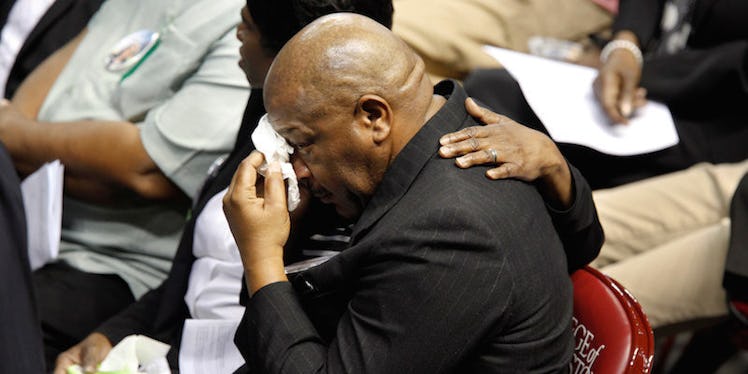
The Charleston Shooting Reminds Us How Quickly We Forget About Hate Crimes
The Charleston shooting was exactly one year ago today.
A young, white gunman entered a historically black church in Charleston, South Carolina, and gunned down nine people as they worshipped. The victims welcomed him into their Bible study, but the hate in his heart led him to open fire.
When one of the victims tried to talk the shooter out of it, he stated,
I have to do it. You rape our women and you're taking over our country. And you have to go.
He later told investigators that he wanted to start a race war.
I have to do it.
This horrendous crime stands as a tragic reminder that the vicious current of hatred still flows through many parts of the United States.
There are many who would like to believe we live in a post-racial society. They argue that African Americans now have equal rights, and that we even have a black president. So, racism must be a thing of the past.
Unfortunately, this couldn't be further from the truth.
Hate crimes are still far too common. Moreover, in terms of racially motivated hate crimes, African Americans are the most likely to be targeted.
FBI data shows that 47 percent of hate crimes in 2014 (the year from which the latest numbers are available) were racially motivated. Law enforcement officials reported that 3,081 single-bias hate crime offenses were racially motivated in 2014, and of these offenses, 63.5 percent were the product of anti-black or African American bias.
Racism continues to exist in the United States in many forms. To deny this is to insult the memories of the nine innocent people who lost their lives on June 17, 2015.
We owe it to these individuals to acknowledge that we have not yet established a fully equal and tolerant society. Perhaps we never will.
But that doesn't mean it's not something to strive toward.
We can't afford to fall into complacency when it comes to the bigotry that continues to plague America.
Correspondingly, it's important we acknowledge that the shooting at a gay nightclub in Orlando last Sunday was also the product of hate.
The LGBTQ+ community is more likely than any other minority group to be subjected to hate crimes.
LGBTQ+ people are twice as likely to experience hate crimes than African Americans. Gay marriage might be legal nationwide, but it's quite clear that not everyone is happy about it.
Just because something is accepted by law, that doesn't mean it's accepted or tolerated by society.
We need to remember this with regard to race, ethnicity, religion, sexual orientation, disabilities, gender and beyond.
If we truly want to honor the victims in crimes like the shootings in Charleston and Orlando, we have to remember that hate crimes are a common problem in this country.